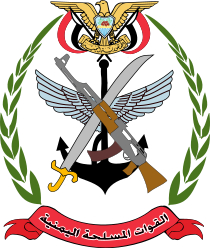User:Ahmedaliyemen/sandbox
Yemen Portal
 |
Yemen (/ˈjɛmən/ ⓘ; Arabic: ٱلْيَمَنْ, romanized: al-Yaman), officially the Republic of Yemen, is a sovereign state in West Asia. Located in the southern Arabian Peninsula, it borders Saudi Arabia to the north, Oman to the northeast, and the Indian Ocean to the south, sharing maritime borders with Eritrea, Djibouti and Somalia across the Horn of Africa. Covering roughly 528,000 square kilometres (203,861 square miles), with a coastline of approximately 2,000 kilometres (1,200 miles), Yemen is the second largest country on the Arabian Peninsula. Sanaa is its constitutional capital and largest city. Yemen's estimated population is 34.7 million, comprised mostly of Arab Muslims. It is a member of the Arab League, the United Nations, the Non-Aligned Movement and the Organisation of Islamic Cooperation.
Owing to its geographic location, Yemen has been at the crossroads of many civilisations for over 7,000 years. In 1200 BCE, the Sabaeans formed a thriving commercial kingdom that included parts of modern Ethiopia and Eritrea. In 275 CE, it was succeeded by the Himyarite Kingdom, which spanned much of Yemen's present-day territory and was heavily influenced by Judaism. Christianity arrived in the fourth century, followed by the rapid spread of Islam in the seventh century. Yemenite troops playing a crucial role in early Islamic conquests. Various dynasties emerged between the 9th and 16th centuries. During the 19th century, the country was divided between the Ottoman and British empires. After World War I, the Mutawakkilite Kingdom of Yemen was established, which in 1962 became the Yemen Arab Republic (North Yemen) following a coup. In 1967, the British Aden Protectorate became the independent People's Democratic Republic of Yemen (South Yemen), the first and only officially socialist state in the Arab world. In 1990, the two Yemeni states united to form the modern Republic of Yemen (al-Jumhūrīyah al-Yamanīyah), with Ali Abdullah Saleh serving as the first president until his resignation in 2012 in the wake of the Arab Spring.
Since 2011, Yemen has been enduring a political crisis, marked by street protests against poverty, unemployment, corruption, and President Saleh's plan to amend Yemen's constitution and eliminate the presidential term limit. By 2015, the country became engulfed by an ongoing civil war with multiple entities vying for governance, including the Presidential Leadership Council of the internationally recognized government, the Houthi movement's Supreme Political Council, and the separatist Southern Movement's Southern Transitional Council. This conflict, which has escalated to involve various foreign powers, has led to a severe humanitarian crisis. (Full article...) User:Ahmedaliyemen/sandbox/box-footer
This is the show new selections clickable link
The Yemeni Armed Forces (Arabic: الْقُوَّاتُ الْمُسَلَّحَةُ الْيَّمَّنِيَّة, romanized: Al-Quwwat Al-Musallahah Al-Yamaniyah) are the military forces of the Republic of Yemen. They include the Yemeni Army (including the Republican Guard), Yemeni Navy (including the Marines) and the Yemeni Air Force (including the Air Defense Force). The capital of the country, Sana’a is where the military is headquartered. Per the constitution of Yemen, the President of Yemen serves as the commander-in-chief.
The supreme commander of the armed forces is disputed between Rashad al-Alimi, Chairman of the internationally recognized Presidential Leadership Council, and Mahdi al-Mashat, the chairman of the Supreme Political Council. (Full article...)List of selected articles
|
|---|
Selected article -
Selected article -
Yemen's constitution is based on a combination of sharia, old Egyptian laws, and Napoleonic tradition. Defendants are presumed innocent until proven guilty; indigent defendants in felony cases are by law entitled to counsel, but in practice this does not always occur. Trials, which are generally public, are conducted without juries; judges adjudicate criminal cases. All defendants have the right of appeal. Women often suffer discrimination, particularly in domestic matters.
Although Yemen's constitution provides for an autonomous judiciary and independent judges, in reality the judiciary is managed by an executive-branch council, the Supreme Judicial Council (SJC), and judges are appointed and can be removed by the executive branch. The judicial system itself is considered weak; corruption is widespread; the government is often reluctant to enforce judgments; and judges are subject to harassment from tribal leaders, who themselves exercise significant discretion in the interpretation and application of the law. There have been several restructurings of the judiciary since the government initiated a judicial reform program in 1997, but none have resulted in any significant improvements in the functioning of the system or produced evidence of having reduced corruption. (Full article...)Featured biography
The page "User:Ahmedaliyemen/sandbox/Featured biography/6" does not exist.
General images -
Did you know...
Related portals
User:Ahmedaliyemen/sandbox/Related portals











